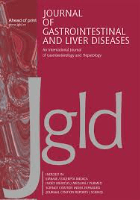
Expert Review of Gastroenterology & Hepatology
Scope & Guideline
Empowering Professionals with High-Impact Research
Introduction
Aims and Scopes
- Clinical Management Strategies:
The journal emphasizes practical management approaches for various gastrointestinal and liver conditions, including inflammatory bowel diseases, liver cirrhosis, and cholangiocarcinoma. It aims to provide clinicians with evidence-based guidelines and consensus recommendations. - Diagnostic Innovations:
It covers advancements in diagnostic methodologies such as imaging techniques and biomarker identification, focusing on improving early detection and accurate diagnosis of gastrointestinal disorders. - Therapeutics and Treatment Outcomes:
The journal publishes research on novel therapeutics, including medication efficacy and safety, treatment protocols, and the integration of new therapies into clinical practice, particularly in areas like hepatocellular carcinoma and inflammatory bowel diseases. - Interdisciplinary Approaches:
There is a consistent focus on integrating insights from various fields, such as immunology, genetics, and microbiology, into the understanding and treatment of gastrointestinal and liver diseases. - Pediatric Gastroenterology:
The journal also addresses pediatric gastrointestinal disorders, highlighting unique challenges and treatment strategies tailored for younger patients.
Trending and Emerging
- Personalized Medicine:
There is a growing trend towards personalized medicine, particularly in the treatment of liver diseases and inflammatory bowel diseases, as research increasingly focuses on tailoring therapies based on individual patient profiles. - Integrative and Holistic Approaches:
Emerging themes include integrative approaches that combine pharmacological treatments with lifestyle interventions, emphasizing a holistic view of patient care. - Artificial Intelligence and Technology Utilization:
The integration of artificial intelligence and advanced technologies in diagnostics and treatment planning is gaining prominence, with research exploring their potential to enhance clinical outcomes. - Microbiome Research:
An increased focus on the role of the gut microbiome in gastrointestinal health and disease is evident, with studies investigating its impact on treatment responses and disease progression. - Innovations in Minimally Invasive Procedures:
Advancements in minimally invasive endoscopic techniques and surgical procedures are trending, reflecting a shift towards less invasive options that enhance patient recovery and outcomes.
Declining or Waning
- Traditional Diagnostic Methods:
There appears to be a decreased emphasis on conventional diagnostic methods such as standard endoscopy, as newer imaging techniques and molecular diagnostics gain traction. - Generalized Treatment Approaches:
The focus on generalized treatment protocols without personalization is waning, as there is a growing recognition of the need for tailored therapies based on genetic and molecular profiles. - Acute Gastrointestinal Conditions:
Research on acute gastrointestinal conditions, while still relevant, seems to have decreased in favor of chronic conditions and long-term management strategies. - Basic Science Publications:
The journal has shifted towards more clinically applicable research, leading to a decline in basic science studies that do not directly translate to patient care.
Similar Journals

Translational Gastroenterology and Hepatology
Leading the Charge in Translational Medicine for Digestive Health.Translational Gastroenterology and Hepatology, published by AME Publishing Company, stands as a pivotal platform for advancing the understanding and treatment of gastrointestinal and liver diseases. With its focus on translational research, this journal aims to bridge the gap between laboratory discoveries and clinical applications, thus fostering improvements in patient care. Although specific metrics like H-Index and Scopus ranks are currently unavailable, the journal is committed to maintaining high standards of scholarly communication and excellence. As an open-access publication, it ensures that valuable findings are readily accessible to a global audience, promoting collaboration and innovation among researchers, clinicians, and healthcare professionals invested in gastroenterology and hepatology. The journal's dedication to disseminating groundbreaking research makes it an essential resource for those seeking to stay at the forefront of these ever-evolving fields.

Journal of Gastrointestinal and Liver Diseases
Elevating Research in Gastroenterology and HepatologyThe Journal of Gastrointestinal and Liver Diseases, published by MEDICAL UNIV PRESS in Romania, serves as a pivotal platform for the dissemination of significant research in the fields of gastroenterology and hepatology. Established in 2006, this journal has evolved over the years, currently holding a Q3 rank in Gastroenterology and a Q2 rank in Medicine (miscellaneous), reflecting its commitment to high-quality scholarship and impactful contributions to medical science.
With an ISSN of 1841-8724 and an E-ISSN of 1842-1121, the journal engages a diverse readership of researchers, clinicians, and students passionate about advancing knowledge in gastrointestinal and liver health. While it currently does not operate under an open access model, the journal remains a vital resource for those seeking to stay updated on the latest developments and emerging trends in the field. As it converges towards a broader impact, projected through its coverage until 2024, the Journal of Gastrointestinal and Liver Diseases continues to contribute to the academic landscape, encouraging innovation and comprehensive understanding in digestive health.

Canadian Journal of Gastroenterology and Hepatology
Fostering Collaboration in Gastrointestinal and Liver StudiesCanadian Journal of Gastroenterology and Hepatology, published by HINDAWI LTD, serves as a vital resource in the fields of gastroenterology and hepatology. Since its inception in 1987, this open-access journal has made significant contributions to advancing research and clinical practice through its comprehensive coverage of topics ranging from liver diseases to gastrointestinal disorders. With an impressive Q2 ranking in Gastroenterology and a Q3 ranking in Hepatology as of 2023, the journal has established itself as an influential platform for researchers and healthcare professionals seeking to disseminate and acquire knowledge. The journal is based in Egypt, with its operational headquarters located in London, England. Notably, it holds a respectable standing in Scopus rankings, placed at Rank #64 in Gastroenterology and Rank #34 in Hepatology, reflecting its impact and relevance in the medical community. With a commitment to quality and accessibility, the Canadian Journal of Gastroenterology and Hepatology continues to foster innovation and collaboration among its readers.

Minerva Gastroenterology
Elevating Clinical Practices with Cutting-Edge InsightsMinerva Gastroenterology, published by EDIZIONI MINERVA MEDICA, is a notable academic journal dedicated to advancing the field of gastroenterology and related disciplines. With an ISSN of 2724-5985 and an E-ISSN of 2724-5365, this journal gathers innovative research from diverse areas including internal medicine, endocrinology, and metabolism. Though characterized by its open-access policies, Minerva Gastroenterology aims to provide a platform for high-quality scholarly articles with an emphasis on critical reviews, clinical studies, and translational research. Since its inception in 2021, the journal has managed to secure a reputation reflected in its Q3 rank across multiple categories in 2023, as well as its standing in Scopus rankings, positioning it in the 45th to 47th percentile among renowned medical journals. Situated in Turin, Italy, it fosters collaboration and knowledge-sharing among researchers and practitioners, making it an essential resource for those seeking to deepen their understanding of gastroenterological conditions and enhance clinical practices.

Gastroenterology Insights
Fostering Collaboration in Gastrointestinal ResearchGastroenterology Insights is a premier open-access journal published by MDPI since 2009, focusing on essential research and developments within the fields of gastroenterology and hepatology. With a dedicated ISSN of 2036-7414 and E-ISSN 2036-7422, this journal serves as a vital platform for disseminating innovative studies and insights pertinent to gastrointestinal health, disorders, and treatment modalities. Based in Switzerland, Gastroenterology Insights boasts a significant academic presence, currently positioned in the Q3 quartile for both gastroenterology and hepatology categories as of 2023, reflecting its impactful contributions to the disciplines. With Scopus rankings placing it at the 94th and 48th positions in gastroenterology and hepatology respectively, the journal is committed to advancing knowledge and fostering collaboration among researchers, professionals, and students alike. By providing an open-access model, it ensures that high-quality research is accessible globally, thereby enhancing the reach and impact of crucial findings in the science of digestive health. Researchers looking to publish cutting-edge work will find Gastroenterology Insights a valuable resource for both sharing and acquiring knowledge.

JOURNAL OF PEDIATRIC GASTROENTEROLOGY AND NUTRITION
Exploring the vital link between digestion and childhood well-being.Journal of Pediatric Gastroenterology and Nutrition is a premier academic journal published by Wiley, focusing on the critical intersection of pediatric gastroenterology and nutrition. Established in 1982, this journal has been at the forefront of research and clinical practices for over four decades and continues to contribute invaluable insights to the fields of pediatrics and gastrointestinal health, boasting a Q1 ranking in Pediatrics, Perinatology and Child Health and a Q2 ranking in Gastroenterology as of 2023. The journal features a comprehensive array of original research, review articles, and clinical studies aimed at improving the understanding and management of pediatric gastrointestinal disorders and nutrient imbalances. Edited with expertise, the Journal of Pediatric Gastroenterology and Nutrition serves as an essential resource for clinicians, researchers, and students dedicated to advancing the well-being of children with digestive health issues. Readers can access the journal's impactful research studies through traditional subscriptions.

Gut and Liver
Connecting science and practice in digestive health.Gut and Liver is a prestigious peer-reviewed journal dedicated to advancing the fields of Gastroenterology and Hepatology. Published by the EDITORIAL OFFICE GUT & LIVER in South Korea, this Open Access journal has been disseminating valuable research findings since 2007, making critical knowledge accessible to a global audience. With an impressive 2023 impact factor that places it in Q1 rank in both Gastroenterology (#28/167) and Hepatology (#22/82), it is recognized as a leader in the medical domain. The journal covers diverse topics, including innovative therapeutic strategies, clinical practices, and groundbreaking research in liver diseases and gastrointestinal disorders, thereby playing a vital role in improving patient care and outcomes. Researchers, healthcare professionals, and students can benefit from the journal's wealth of information, designed to foster collaboration and spark new ideas within the scientific community. For further engagement with current research, readers can access issues from 2009 to 2024 and stay updated on the latest advancements in the field.

Frontline Gastroenterology
Advancing the Frontiers of GastroenterologyFrontline Gastroenterology is a leading academic journal published by the BMJ Publishing Group that plays a vital role in advancing the field of gastroenterology and hepatology. Established in 2013, this prestigious journal has established itself as a significant resource for researchers, healthcare professionals, and students alike, maintaining a commendable impact factor and consistently achieving a Q2 ranking in both gastroenterology and hepatology categories as of 2023. With its focus on disseminating high-quality, peer-reviewed research, Frontline Gastroenterology covers a wide scope of topics pertinent to the understanding, diagnosis, and treatment of gastrointestinal and liver diseases. Although it does not offer Open Access options, its content is accessible through various institutional and personal subscriptions, ensuring that critical findings reach an international audience. As the journal continues to converge into the future, it remains dedicated to fostering innovation and dialogue in gastroenterological sciences.

WORLD JOURNAL OF GASTROENTEROLOGY
Transforming knowledge into practice in gastroenterology.WORLD JOURNAL OF GASTROENTEROLOGY, published by BAISHIDENG PUBLISHING GROUP INC, stands at the forefront of gastrointestinal research, providing a critical platform for the dissemination of high-quality studies in the field. With an impressive impact factor reflected in its Q1 rankings in both Gastroenterology and Miscellaneous Medicine, this journal is recognized for its rigorous peer-review process and commitment to advancing knowledge and practices related to digestive health. Covering comprehensive scopes from clinical advancements to innovative therapies, the journal serves an essential role for researchers, clinicians, and students, enabling them to stay updated on the latest developments and findings from 1998 through 2024. The open access model facilitates broader accessibility, ensuring that groundbreaking research reaches a global audience. The journal's ranking within the top 15% of Scopus demonstrates its significant contribution to the academic community, making it a valuable resource for advancing the science of gastroenterology.

Clinical Gastroenterology and Hepatology
Transforming Knowledge into Clinical PracticeClinical Gastroenterology and Hepatology, published by Elsevier Science Inc, stands as a leading journal in the fields of gastroenterology and hepatology. With an ISSN of 1542-3565 and an E-ISSN of 1542-7714, this esteemed publication has earned its place in the top quartile (Q1) of both gastroenterology and hepatology categories as of 2023, ranking 6th out of 167 and 7th out of 82 respectively. The journal aims to disseminate innovative research, clinical studies, and case reports that advance the understanding and treatment of gastrointestinal and liver diseases. Targeted towards researchers, healthcare professionals, and students, it provides crucial insights into emerging therapies and medical advancements. Clinical Gastroenterology and Hepatology is not only a pivotal resource for contemporary gastroenterological research but also fosters collaboration and knowledge-sharing within the medical community. With a converging publication history from 2003 to the present, the journal continues to build on its solid foundation of scientific excellence and relevance.